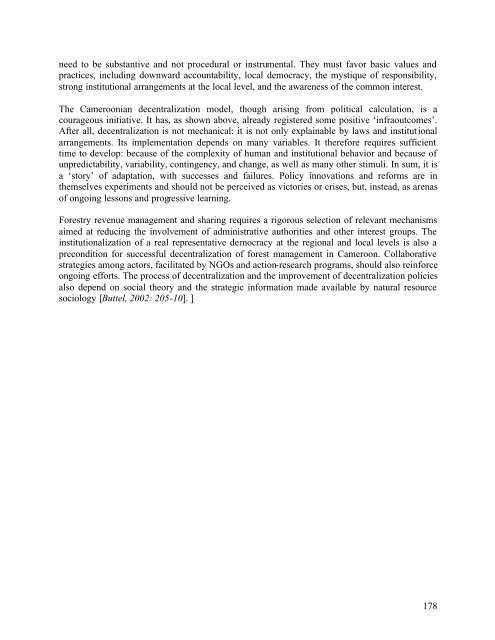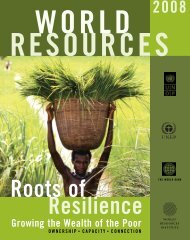need to be substantive <strong>and</strong> not procedural or instrumental. They must favor basic values <strong>and</strong>practices, including downward accountability, local democracy, the mystique <strong>of</strong> responsibility,strong institutional arrangements at the local level, <strong>and</strong> the awareness <strong>of</strong> the common interest.The Cameroonian decentralization model, though arising from political calculation, is acourageous initiative. It has, as shown above, already registered some positive ‘infraoutcomes’.After all, decentralization is not mechanical: it is not only explainable by laws <strong>and</strong> institutionalarrangements. Its implementation depends on many variables. It therefore requires sufficienttime to develop: because <strong>of</strong> the complexity <strong>of</strong> human <strong>and</strong> institutional behavior <strong>and</strong> because <strong>of</strong>unpredictability, variability, contingency, <strong>and</strong> change, as well as many other stimuli. In sum, it isa ‘story’ <strong>of</strong> adaptation, with successes <strong>and</strong> failures. Policy innovations <strong>and</strong> reforms are inthemselves experiments <strong>and</strong> should not be perceived as victories or crises, but, instead, as arenas<strong>of</strong> ongoing lessons <strong>and</strong> progressive learning.Forestry revenue management <strong>and</strong> sharing requires a rigorous selection <strong>of</strong> relevant mechanismsaimed at reducing the involvement <strong>of</strong> administrative authorities <strong>and</strong> other interest groups. Theinstitutionalization <strong>of</strong> a real representative democracy at the regional <strong>and</strong> local levels is also aprecondition for successful decentralization <strong>of</strong> forest management in Cameroon. Collaborativestrategies among actors, facilitated by NGOs <strong>and</strong> action-research programs, should also reinforceongoing efforts. The process <strong>of</strong> decentralization <strong>and</strong> the improvement <strong>of</strong> decentralization policiesalso depend on <strong>social</strong> theory <strong>and</strong> the strategic information made available by natural resourcesociology [Buttel, 2002: 205-<strong>10</strong>]. ]178
ReferencesAgrawal, A. <strong>and</strong> J.C. Ribot, 1999, ‘Accountability in decentralization: A framework with South Asian <strong>and</strong> AfricanCases’, Journal <strong>of</strong> Developing Areas, 33, pp. 473-502.Auzel, P., G. M. Nguenang, R. Fetéké <strong>and</strong> W. Delvingt, 2001, ‘Small-Scale Logging in Community Forests inCameroon: Towards Ecologically more Sustainable <strong>and</strong> Socially more Acceptable Compromises’, RuralDevelopment Network Paper, 25f, London: ODI.Assembe, S., 2000, ‘La démocratie locale dans les organisations nées de la décentralisation de la gestion desressources forestières au Cameroun’, Unpublished field Report, Yaoundé, Cameroun: CIFOR.Assembe, S., 2001, ‘Analyse d’une structure née de la gestion décentralisée des forêts au Cameroun: Le ComitéConsultatif de gestion de la Forêt Communale de Dimako’, Communautés Africaines 79, pp. 13-17.Assembe, S. <strong>and</strong> P. R. Oyono, 2003, ‘An assessment <strong>of</strong> <strong>social</strong> negotiation as a tool <strong>of</strong> local management. A casestudy <strong>of</strong> the Dimako Council Forest (east-Cameroon)’, Paper presented at the International IUFROWorkshop on ‘The Forest Science/Policy Interface in Europe, Africa <strong>and</strong> the Middle-East’, Copenhagen,Denmark, 24-27 June 2003, in review for The Sc<strong>and</strong>inavian Journal <strong>of</strong> Forestry Research.Bailey, R.C., 1992, ‘Forest People’, in J.A. Sayer, C.S. Harcourt <strong>and</strong> N.M. Collins (eds.), The conservation Atlas <strong>of</strong>tropical forests. Africa, Gl<strong>and</strong>, Switzerl<strong>and</strong>: IUCN, pp. 43-8.Bigombé, P., 1998, ‘Vers la décentralisation de l’aménagement forestier au Cameroun: Dynamique de contestationentre l’Etat forestier et de la construction de la gestion participative des ressources forestières’, BulletinArbres, Forêts et Communautés Rurales 15/16, pp. 6-13.Bigombé, P., 2003, ‘The Decentralized Forestry Taxation System in Cameroon: Local Management <strong>and</strong> StateLogic’, Working Paper, Washington, D.C.: WRI.Bratton, M. <strong>and</strong> N. van de Walle, 1997, Democratic Experiments in Africa. Regimes Transitions in ComparativePerspective. Cambridge: Cambridge University Press.Brown, D., 1999, ‘Principles <strong>and</strong> Practices <strong>of</strong> Forest Co-Management: Evidence From West-Central Africa’, draft <strong>of</strong>Report, Washington, D.C.: CARPE.Buttel, F.H., 2002, ‘Environmental Sociology <strong>and</strong> the Sociology <strong>of</strong> Natural Resources: Institutional Histories <strong>and</strong>Intellectual Legacies’, Society <strong>and</strong> Natural Resources 15, pp. 205-11.Carret, J.-C., 2000, ‘La réforme de la Fiscalité Forestière au Cameroun: Débat Politique et Analyse Economique’,Bois et Forêts des Tropiques 264, pp. 37-51.Crook, R.C. <strong>and</strong> J. Manor, 1998, Democracy <strong>and</strong> Decentralization in South-east Asia <strong>and</strong> West Africa:Participation, Accountability, <strong>and</strong> Performance, Cambridge: Cambridge University Press.Dia, M., 1996, Africa’s Management in the Beyond: Reconciling Indigenous <strong>and</strong> Transplanted Institutions,Washington, D.C.: The World Bank.Diaw, M.C. <strong>and</strong> P. R. Oyono, 1998, ‘Instrumentalité et Déficit des Itinéraires de la Décentralisation de la Gestiondes Ressources Naturelles au Cameroun’, Bulletin Arbres, Forêts et Communautés Rurales 15/16, pp. 23-7.Diaw, M.C. <strong>and</strong> P. R. Oyono, 2001, ‘Developing Collaborative Monitoring for Adaptive Co-management <strong>of</strong>Tropical African Forests. Cameroon extract’, European Union Report, Yaoundé : CIFOR.Diaw, M.C., P. R. Oyono <strong>and</strong> V. Robiglio, 2001, ‘Les Dimensions Sociales du Classement et de l’Aménagement desUnités Forestières de Gestion. Enseignements Théoriques sur la Démarche et l’Expérience du Projet «Forêtset Terroirs» de Dimako (Sud-Est Cameroun)’, Working Paper, Yaoundé: CIFOR/IITA.Djeumo, A., 2001, ‘Développement des Forêts Communautaires au Cameroun: Genèse, Situation Actuelle etContraintes’, Rural Development Network Paper, 25b, London : ODI.Eba’a A., R., 1998, ‘Cameroon’s Logging Industry: Structure, Economic Importance Effects <strong>of</strong> Devaluation’,CIFOR Occasional Paper, No. 14, Bogor: CIFOR.179
















